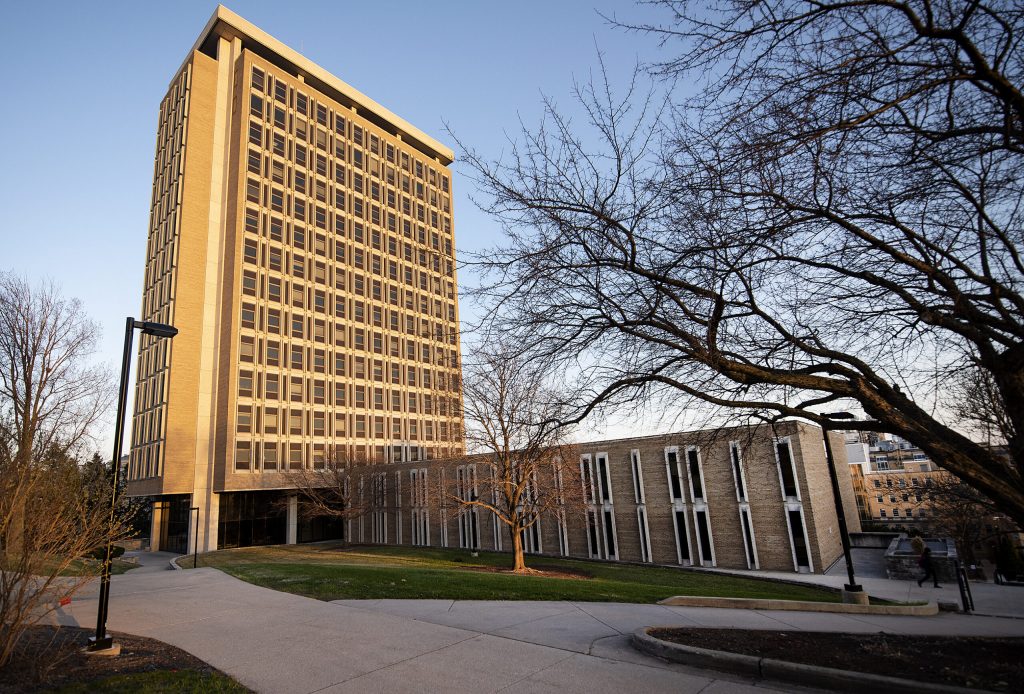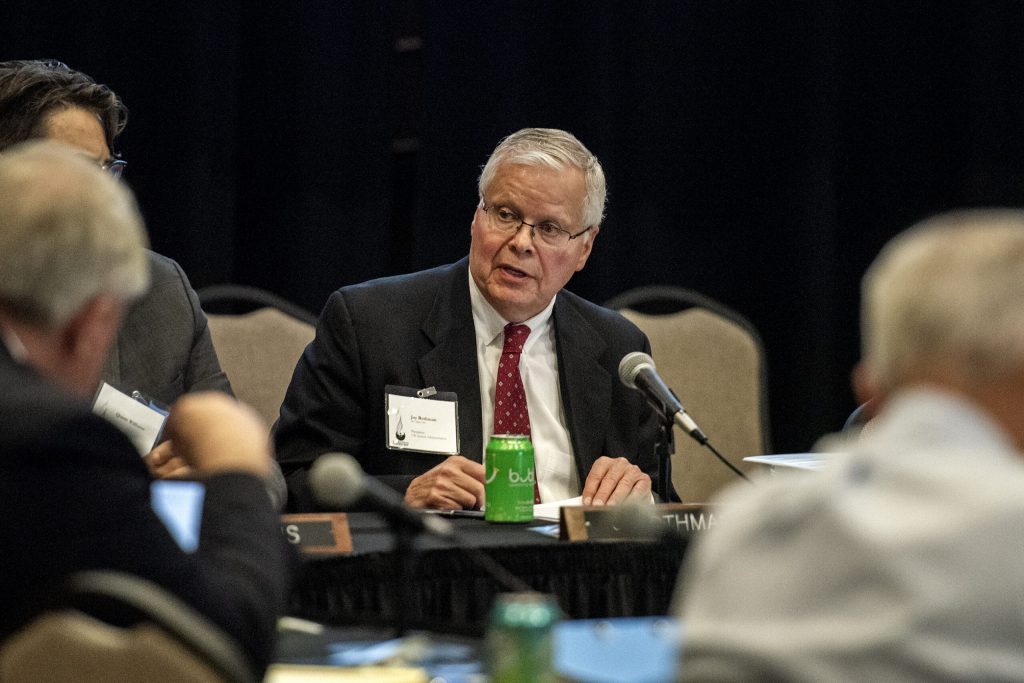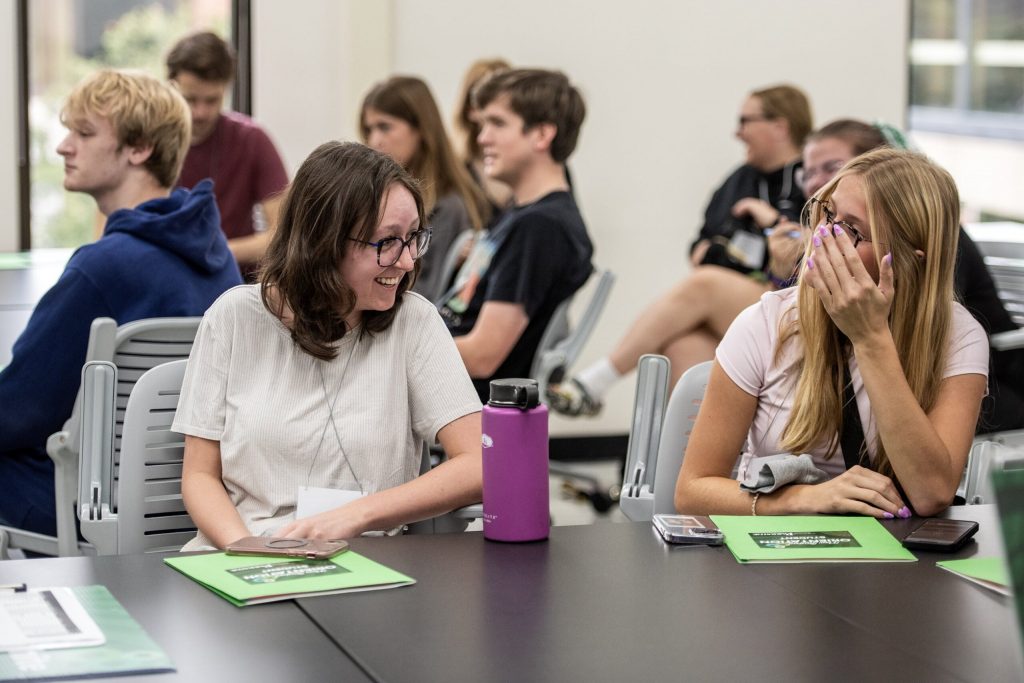UW President Optimistic Tuition Promise, Direct Admission Will Bolster ‘Participation Rate’
Fewer Wisconsin high school graduates are going to college immediately following graduation.

Van Hise Hall on the University of Wisconsin-Madison campus Friday, April 2, 2021, in Madison, Wis. Angela Major/WPR
Universities of Wisconsin President Jay Rothman says he’s hopeful a college tuition promise program, direct admissions and increased state support will reverse an ongoing decline in college participation in the state.
Rothman touched on several familiar themes while testifying before a newly-created Legislative Council Study Committee on the Future of the University of Wisconsin System on Thursday. He cited three main challenges for state universities: declining enrollment, lagging financial support from the Republican-controlled Wisconsin Legislature and a flagging public perception of the value of higher education.
Declining enrollment has been a constant for much of the past decade, though numbers improved slightly last semester. UW enrollment data shows a peak of 182,090 students in 2010 during the Great Recession. That fell to 160,782 in 2022 and recovered slightly last fall.
More troubling, Rothman said, is what the UW calls its “participation rate,” which measures the percentage of high school graduates enrolling in four-year campuses immediately after graduation. From 2009 through 2017, the rate hovered around 32 percent, but fell to a low of around 26 percent in 2022, according to UW data. The rate improved slightly to 27 percent in 2023.
State Rep. Amanda Nedweski, R-Pleasant Prairie, asked Rothman why students “aren’t buying what you’re selling.” Rothman said there are a variety of factors, but the main issue is cost and a national narrative that the cost of higher education has gone “off the charts,” which he attributed mostly to private universities. He said that isn’t the case for in-state students attending UW schools.
“I think sometimes we get caught up in that national narrative, ‘Well, you folks are too expensive, just brushing all of us into that,” Rothman said. “We have to push back on that in Wisconsin and say, ‘Listen, if you are an in state resident coming to one of our universities, you can get a quality education and get out and have that opportunity at a significant economic difference in your life.”

UW System President Jay Rothman speaks Thursday, Aug. 18, 2022 during the UW System Board of Regents meeting at UW-Green Bay. Angela Major/WPR
Republicans question cost of tuition promise, whether direct admissions impacts ‘value of degree’
Rothman touted the Wisconsin Tuition Promise program, rolled out in 2023, which waives costs for students not covered by financial aid if they come from families with incomes below $62,000 per year. He said early data shows the UW participation rate and enrollment ticked up. Rothman said the UW shifted money to pay for the first cohort of students receiving the aid.
“We were not able to do it in the fall of 2024 because we did not have the money,” Rothman said.
He said there is a slimmed down version of the Tuition Promise program for fall 2025 paid in part by a grant from Ascendium Education Group.
For students enrolling in fall of 2025, the new tuition waiver program will pay for the same remaining costs over four years, but the income threshold has dropped and will now cover students from families earning less than $55,000 per year. He contrasted that with the new Minnesota State Promise program that waives tuition and fees for students from families with adjusted gross incomes under $80,000 per year.
“So they have made a commitment to educate, quite frankly, more of their students,” Rothman said.
State Sen. Cory Tomczyk, R-Mosinee, countered by stating, “I wouldn’t worry too much about Minnesota, because it won’t be long and they’ll be bankrupt, and all those people will be coming back over this way at those funding levels.”
Rothman also voiced optimism about a new direct-admission program at 10 of the UW’s 13 campuses that provides automatic admission to high school seniors meeting campus GPA requirements.
Nedweski said her office has gotten feedback from constituents that a new direct admission program “dilutes the value of a degree.”
“And that might not necessarily be the intent, and it might not even be the truth, but I think from my perspective, what I’m hearing from my constituents is that it’s had a negative impact on their public perception,” Nedweski said.
Rothman said while how students are admitted will change, they’ll still have to meet current minimum GPA and course requirements.

Students play a trivia game during orientation Friday, Aug. 25, 2023, at UW-Parkside in Somers, Wisconsin. Angela Major/WPR
Evers proposes $400M increase in funding, committee asks how it would be spent
Like with anything in state government, Thursday’s discussions about the Universities of Wisconsin’s future boiled down to money.
Committee member James Langdon, a former UW system vice president for administration, mentioned Gov. Evers’ promise to recommend increasing state funding for UW campuses by $400 million in his next two-year state budget proposal. A similar $300 million increase was proposed last year by Evers and was rejected by Republican lawmakers.
“Are you going to reduce tuition substantially to use those funds?” Langdon asked. “Or do you have some other plan for them?”
Rothman said the new money would go toward broadening the tuition promise program. He said it would also go toward student support services like academic and career advising and student mental health.
“A part of it is we also need to deal with our compensation issue,” Rothman said. “We cannot continue to think that we can pay people in our market and think we’re going to get great people.”
Committee member Bob Atwell, who recently ended a term as a member of the UW Board of Regents, hit on the pay issue. He called it embarrassing that it’s been discussed at several board meetings but the UW hasn’t identified how much money it will take to bring wages in line with other peer universities.
Atwell also criticized the UW for the decision to close several of its two-year college campuses over the past two years without acting more aggressively to put out a vision of what the right size of the Universities of Wisconsin should be.
Rothman said he appreciated Atwell’s comments, but said the UW has been making “bold” changes to eliminate structural deficits at several four-year universities. As for the campus closures, Rothman said that too is part of addressing changing demand from students who aren’t as interested in getting two-year associate’s degrees from UW schools as they once were.
UW President Jay Rothman optimistic tide will turn for state universities was originally published by Wisconsin Public Radio.
If you think stories like this are important, become a member of Urban Milwaukee and help support real, independent journalism. Plus you get some cool added benefits.





















